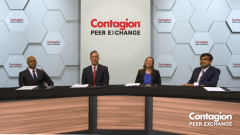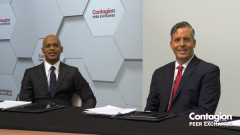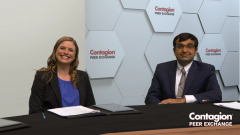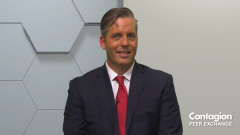
Selecting Therapy for Recurrent CDI: The Potential for FMT
The panel considers optimal therapy for recurrent CDI, particularly the role of fecal microbiota transplantation.
Episodes in this series

Transcript:
James A. McKinnell, MD: Unfortunately, Lucy has a recurrence. Her recurrence is 15 days after completion of therapy. She has a recurrence of 6 loose bowel movements a day. She’s not critically ill, but she is presenting in the ED [emergency department], a little tachycardic, a little dehydrated. What’s our approach?
Sahil Khanna, MBBS, MS: I would first talk to my ED guys and say, we have 3 different guidelines, pull any one of them. You won’t go wrong this time around because the guidelines are updated. In my practice, I would think about starting on something different than the first time if Lucy got fidaxomicin.
James A. McKinnell, MD: Let’s assume Lucy who got vancomycin up front.
Sahil Khanna, MBBS, MS: If Lucy got vancomycin up front, I would think about using fidaxomicin, either standard course or extended course, whatever we are able to get. The number of pills is the same though. We must keep that in mind, the standard course is 20 pills, extended course is 20 pills. It’s just about how you instruct your patients to take it, so they don’t forget.
Carl V. Crawford, MD: That’s the key, it’s the instructions because we don’t know how sometimes patients take their medicines, whether someone else is giving it to them, or they’re taking it on their own, so it all depends on what the compliance will be.
Kelly R. Reveles, PharmD, PhD, BCPS: I agree. If they got oral vancomycin up front, I would probably do fidaxomicin in the extended-pulsed regimen.
James A. McKinnell, MD: Where in this world do we think about fecal transplant?
Sahil Khanna, MBBS, MS: Not quite yet for clinical fecal microbiota transplantation [FMT] because most of the guidelines, what the studies have done, and what the FDA says, it’s for multiply recurrent Clostridioides difficile infection. But for 2 episodes, we do have microbial restoration therapies that patients may be eligible to be in clinical trials for. For 2 episodes, they start thinking about clinical trials, placebo controlled or open-label, but fecal transplant, not quite yet.
Carl V. Crawford, MD: You must wait for that second recurrence, that’s a third episode that they’ve received before we can start considering that. It’s an option. It’s not FDA approved, but it is something for us to consider because it’s still considered investigational.
Sahil Khanna, MBBS, MS: Jimmy, the trouble that I get from patients is why do you want to wait for that third episode, which I don’t have a good answer for myself despite doing this for so long. Why can’t you do it when I have that 40% chance of it coming back? Why do you have to go against that until you get a 60% chance of it coming back? That’s something that we need to keep discussing as a scientific community. The newer trials that are happening for microbial restoration that are including people early, that will help solve that problem too.
Kelly R. Reveles, PharmD, PhD, BCPS: That’s what I was going to say. It’s just because we don’t have the data. What’s interesting, the current recommendations, waiting until that third episode, most of those patients were treated with oral vancomycin or even metronidazole before the FMT. Now that we have therapies that are more effective in preventing recurrence up front, I tend to think we may end up moving FMT up front. If you fail or have a recurrence on fidaxomicin or extended-pulsed fidaxomicin, I tend to think, again, we need the data to support this, but we may end up moving FMT earlier.
Carl V. Crawford, MD: I agree. I think one of the things that you had mentioned earlier was how the microbiome is very similar to a fingerprint. Every time one considers doing an FMT, you’re basically giving a unique product to an individual. From an FDA perspective, they’re concerned about giving something that’s uniquely different to individuals over time because there is some unknown with what we’re doing. That’s why they consider it investigational, and it’s for the safety of the patient because there are some things that we never knew were associated with the microbiome. Earlier, Dr Khanna had mentioned that there are some dysbiotic changes that can affect extraintestinal parts of the human body. There are relationships with dysbiosis and obesity, and cardiometabolic effects, muscular disorders, neurologic disorders, autism, Parkinson disease, multiple sclerosis. There’s so much unknown about FMTs that we do have to use caution. Instead of using it up front, we see a patient who has multiple recurrences and we say, “Well, at this point, the risks of your recurrences are so high that we can now accept the benefits over the risk of FMT.” As we do more and more studies that move from case controls and retrospective reviews, and we start doing randomized placebo-controlled trials, we’ll start to see that FMT can be used in the correct populations at the correct times in order to get the kinds of outcomes we really desire.
Sahil Khanna, MBBS, MS: We also need long-term safety data, and there are already efforts around that. A lot of the clinical trials are now extending their safety from 1 year to 2 years. Also the American Gastroenterological Association, or the AGA, has set up an NIH [National Institute of Health]-funded 10-year registry where they plan to enroll about 4000 patients and follow them for 10 years, so that we don’t have a hepatitis C-like story from blood transfusion back in the day come up. There are already safety signals that have come up. There is infectious transmission of ESBL [extended-spectrum beta-lactamases], E. coli [Escherichia coli], that we’ve all seen, 2 unfortunate cases related to FMT. We have to always pause. We must make sure that we are doing everything that we can to make this particular experimental therapy very safe for our patients.
James A. McKinnell, MD: Thank you for watching this HCPLive® Contagion® Peer Exchange. If you enjoyed the content, please subscribe to our e-newsletters to receive upcoming Peer Exchanges and other great content right in your inbox.
Transcript edited for clarity.
Newsletter
Stay ahead of emerging infectious disease threats with expert insights and breaking research. Subscribe now to get updates delivered straight to your inbox.





































































































































